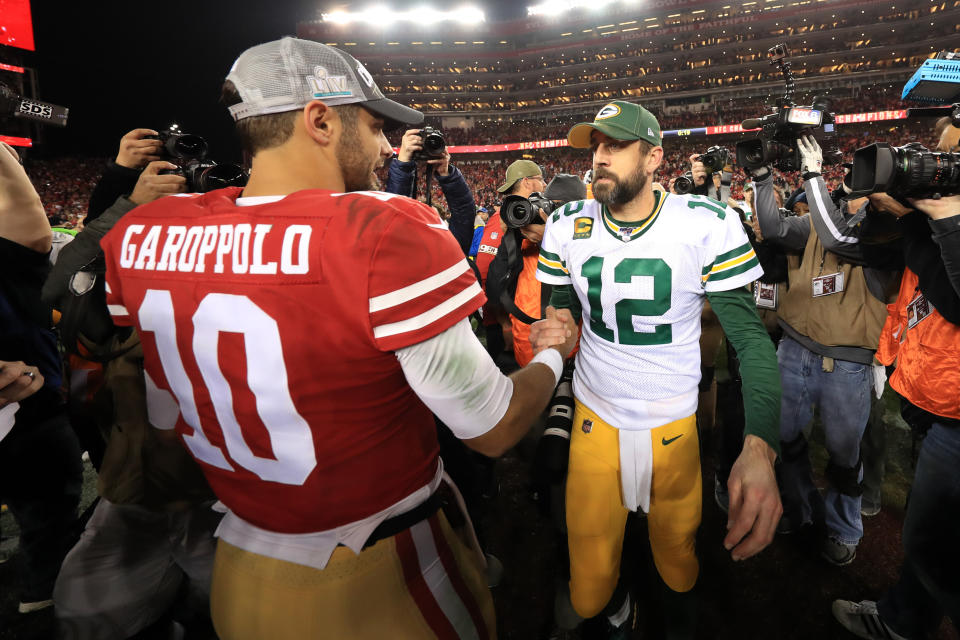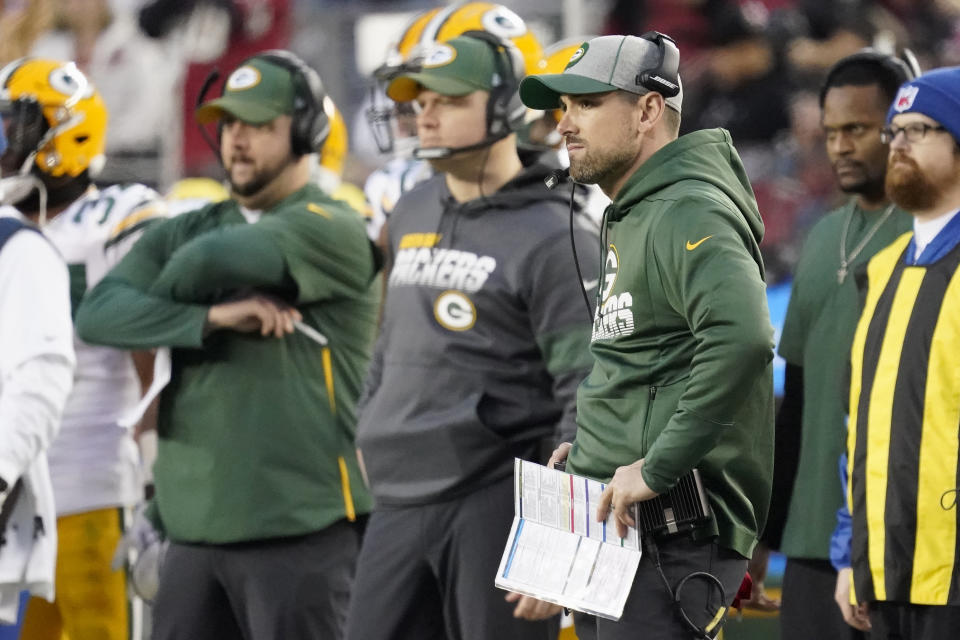After a crushing NFC title defeat, the Green Bay Packers have to face some facts with an aging Aaron Rodgers
SANTA CLARA, Calif. — In a season of blue skies, the closing context on Aaron Rodgers was framed in a sobering hue for the Green Bay Packers.
A board member on the NFL’s committee of iconic aging quarterbacks, Rodgers entered a room Sunday night wearing a gray jacket and gray sweatshirt. He stood at a podium in front of a gray background, reflecting in gray tones on a loss to the San Francisco 49ers. And once he turned an eye toward the future, he was peppered with mostly gray questions.
Was another resounding loss to the 49ers a sign of the gap facing the Packers?
Did the team need to surround him with more offensive talent?
Is this when Aaron Rodgers begins thinking about his football mortality?
When you fall behind 27-0 at halftime of an NFC championship game and then never quite get within threatening distance, this is the autopsy that awaits. This is the “What just happened?” moment, soon to be partnered with the “What happens next?” anxiety. And rightfully so. This is the NFL, after all.
In the past 15 years, only one team (the 2011 49ers) got back to the NFC title game after losing the year before. Even under the best of circumstances and with the best talent in your conference, nothing is guaranteed. Just ask Drew Brees and the No. 1 seed New Orleans Saints, who lost in last season’s NFC title game, and then were one-and-done in these playoffs.
Of course, Rodgers handled it all in stride on Sunday night, talking about finding enjoyment in the game again under head coach Matt LaFleur and how the team had the right leadership in place to close the Super Bowl gap. It was an expected response. He coined the “R-E-L-A-X” movement with the Packers only a few years ago and appears to be in an even better place in his career.

As Rodgers put it Sunday night, “The pieces are in place — where last year, I felt like we really needed to reload. Obviously we were 6-9-1 [in 2018]. Now it’s just adding to [it] and keeping the framework of the leadership in place. I feel good about our team going forward and our organization.”
The optimism is understandable, given that LaFleur was an almost completely unknown commodity heading into 2019 and few had Super Bowl expectations for these Packers. As Rodgers said on Sunday night, this was a franchise that did so many things right in Year 1 under a new head coach that this ride almost seemed like it was manifest destiny unfolding with each passing week. Rather than worrying about an alarming string of one-score games that broke Green Bay’s way or an offense that featured only two difference-makers beyond Rodgers, it was easier to focus on a brand of momentum that this franchise hadn’t seen in some years.
And why not? General manager Brian Gutekunst arguably won the entire offseason with a portfolio of moves that rebuilt a defense and turned Green Bay’s pass rush into one of the league’s most fearsome. Meanwhile, LaFleur and the coaching staff empowered players to take more of a leadership role without worrying about egos or credit. In reality, this was a top-to-bottom reboot, including the front office, the head coach and the culture. The kind of thing that a quarterback like Rodgers apparently was looking for as 2018 came to a close.
“This one will always be special because it became fun again,” Rodgers said. “… Just having a player-led team that just really enjoys each other’s company and spends time together, that’s why this year felt different.”
But getting this close and not finishing with a Super Bowl — that’s also where a different kind of pressure comes in for the Packers. A type of expectation that is not unfamiliar, given that Green Bay has now lost four NFC championship games with Rodgers, including three in the past six years. As much as the franchise wants to feel good about what is new and different, the bottom line facts are this: The results aren’t any better than in past years, particularly when you consider that Green Bay lost twice to the 49ers this season in landslide fashion, including a 37-8 thrashing in November.
That this one came at least partially due to three Rodgers turnovers (two interceptions and a fumble) and that he could have easily had two more, the franchise would be wise to recognize a reality that is staring everyone in the face. And that is this: At 36, Rodgers not only has a few years left in his career, but he also is entering a stage where he can’t be expected to elevate the Packers on his own in critical moments.
That doesn’t mean Rodgers is spent. He isn’t anywhere near mediocrity. But he’s also at a late-career plateau that is typically followed by a steady decline. The upside? Rodgers’ plateau is occurring at a very high level, much like the ones encountered by Brees, Tom Brady, Philip Rivers, Ben Roethlisberger and other Hall of Fame quarterbacks in the winter of their careers. That entire crew, including Rodgers, has entered a space where every one of them needs a solid amount of investment around them to continue squeezing out every last drop of their talent.

That’s not a dig, mind you. It’s just an acceptance of fact. Time is simply more relentless than anything guys like Rodgers can throw at it. And it’s incumbent upon Green Bay to recognize that and use this next offseason as the balance to last year’s defensive bonanza. In other words: Invest in pieces that can maximize whatever window Rodgers has left. Don’t assume that players like wide receivers Marquez Valdes-Scantling and Allen Lazard will get better with age or scheme development. Don’t assume that a 33-year-old Jimmy Graham has a late-career resurgence. Don’t make the kind of conservative mistake that the New England Patriots made with Brady this season — failing to attack the lack of skill position talent and then falling into straights when the Antonio Brown mistake was scuttled, and Josh Gordon was cut loose.
After the hurt and frustration fades — and when the gray of this lost opportunity lifts — Green Bay should walk away from Sunday’s loss with a succinct measure of knowledge. One that tells the decision-makers that now is the time to act in favor of Rodgers, before it’s too late. And that next season can’t devolve into a situation where he’s the one left to raise all boats when the Packers run into a ferocious 49ers team on the road, needing brilliance from a quarterback just to stay competitive.
Rodgers knows this, even if he accepts it or is too diplomatic to say it. He knows that another offseason of additions have to be a priority. Some smart additions and subtractions have to take place if this isn’t going to become another missed opportunity that will dog the franchise when this quarterback is gone.
It’s a sobering final thought in a season that exceeded even the most optimistic expectations. But it’s one that is necessary if this is going to be Rodgers’ latest chance at one more Super Bowl, rather than his last chance at one.
More from Yahoo Sports:

